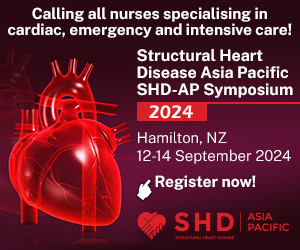
Johnston was finally able to collect her NZNO nurse of the year award in person at COASTN’s symposium recently, along a new COASTN award for transport nursing excellence.
Johnston, associate charge nurse at Dunedin Hospital’s intensive care unit, has been a flight nurse for more than 20 of her 27 years’ nursing. “I’m an old bugger”, she told Kaitiaki Nursing New Zealand, but still loves getting “stuck in” to her adventurous job.
A day might start with a routine pick up out of Invercargill Hospital and end up “on your hands and knees on the floor of the cafe at Curio Bay looking after the acute MI [myocardial infarction/heart attack] patient who looked like they were going to die,” Johnston says. “And being able to make a difference, and getting her back alive.”
‘If you’re like me and like pottering around in the middle of the night and getting stuck into all the blood and guts and gore, there is something for you in nursing.’
A memorable case involved a teenage girl some years back who needed to transfer from a small regional hospital to Auckland for a heart transplant within 24 hours.

Deteriorating weather meant the helicopter couldn’t take her to Christchurch for a connecting flight. The heart transplant service sent “a flash wee private jet with cream leather seats” but no medical supplies or crew. Johnston took all the supplies with her and accompanied the teenager to Auckland.
“She had her transplant and was back in ICU before I left Auckland,” recalls Johnston, who touched down 24 hours after her shift had began. “I kept in touch with the family for quite some time after that, which was really neat.”
‘Invisible’ NZNO work
For the past few years she’s also been involved in COASTN, putting in incalculable “invisible” hours advocating for transport nurses, on top of her demanding day job.
Having a national perspective has been helpful to her Southern critical care team, Te Puna Wai Ora, she says.
“It was really beneficial for us to work with other services around the country to see how things are done differently.”
For example, when her team started up a fixed-wing service (alongside helicopters) two years ago, “having those contacts, those networks, to work out how to do things, to get ideas, was really useful”, she said. “So that, for me, was the pay back for all that voluntary time — for our service to be able to benefit from that.”
‘You can’t stay there forever. I think it’s really important that there are new faces, new blood and new ideas.’
At COASTN, she has worked on standardising flight/transport nurses’ scope of practice and fought hard to ensure the vital role of flight nurses was recognised amid a national (and ongoing) review of air ambulance services.
“They had to give us some voice. We jumped up and down and said we need to be included, so that’s happening, which is good.”

For Johnston, these were all “really invaluable” experiences and connections.
“Meeting people, learning behind the scenes about how the colleges run, that professional arm of NZNO. And meeting people like Annie [Bradley-Ingle, NZNO professional nursing advisor] who are just incredible – the passion they have for nursing and supporting us doing this, are just incredible,” Johnston says.
Time to stand aside
But, she says, it’s time to stand aside.
‘There just aren’t words for her absolute dedication to nursing, but particularly for flight nursing.’
“You can’t stay there forever. I think it’s really important that there are new faces, new blood and new ideas, that other people are given a chance to have the opportunities to grow and develop, like I have, being part of the college.”
New COASTN chair Lynette Will said Johnston had “been instrumental in setting the standard all transport nurses should aspire to.
“Toni has progressed the voice of the COASTN committee by actively engaging with policy-makers, flight teams and consumers”, Will said. “She ensures the teams that she works with are well-supported and well-trained and this benefits the patients that use the service.”

Her COASTN colleagues’ nomination for both awards said Johnston’s work had contributed to the college’s skills & competency framework and COASTN’s passport as well as highlighting the work of flight nurses.
Bradley-Ingle said she couldn’t express how much dedication Johnston had for the profession. “There just aren’t words for her absolute dedication to nursing, but particularly for flight nursing.”
Nursing has niches ‘for everyone’
Johnston would recommend nursing to anyone as a career.
“It surprises me the amount of people who go ‘Oh don’t go nursing’, [who] talk about bullying and things like that . . . I still think it’s a really good career, there’s a niche for everybody.
“If you want to work Monday to Friday there’re jobs that you can do that in. If you’re like me and like pottering around in the middle of the night and getting stuck into all the blood and guts and gore, there is something,” Johnston says.
“There is something for everybody but you have to be people-focused and realise it’s not always about you.”
And while she’s stepping down as chair, Johnston has no plans to slow down. “I still fly as often as I can, because I love it.”



